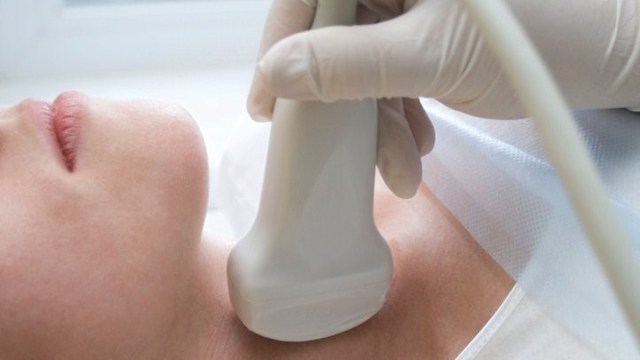Thyroid nodules, which are growths in the thyroid gland are a fairly common condition. Columbia University Medical Center noted that 50 percent of the population throughout the world has this condition.
These nodules may be benign, though a small percentage of cases are malignant. The treatment for a thyroid nodule will depend on the individual case.
Treatment for Benign Thyroid Nodules
If a patient has a benign thyroid nodule, she may not need treatment for the time being. The MayoClinic.com stated that with a benign thyroid nodule, the physician may recommend watching the thyroid nodule.
The patient would undergo a second physical examination at six months. If it does not change, the patient may not need any additional treatment and will have yearly check-ups to monitor the thyroid nodule. But if the thyroid nodule becomes larger, the patient may require intervention, such as thyroid hormone suppression therapy or surgery.
With thyroid hormone suppression therapy, the patient takes a synthetic form of the thyroid hormone thyroxine. This treatment would tell the pituitary gland to produce less thyroid-stimulating hormone.
The MayoClinic.com noted that there is no clear evidence that thyroid hormone suppression therapy shrink thyroid nodules.
Surgery may be required for the thyroid nodule if it affects the patient’s breathing or swallowing. Columbia University Medical Center pointed out that some patients undergo surgery for cosmetic reasons.
Treatment for Malignant Thyroid Nodules
If the thyroid nodule is cancerous, the patient would undergo surgery. The surgeon not only removes the malignant thyroid nodules, she also removes most of the thyroid tissue, which is a surgical procedure called near-total thyroidectomy.
Side effects may occur with this treatment for thyroid nodules, such as damage to the parathyroid glands or the nerves that control the vocal cords. Patients who undergo a thyroidectomy will need to take synthetic thyroxine.
Treatment for Hyperthyroidism Causing Thyroid Nodules
In some cases, a thyroid nodule can cause hyperthyroidism, or an overproduction of thyroid hormones. Options include radioactive iodine and anti-thyroid medications.
The radioactive iodine, which is taken orally either as a liquid or capsule, causes the thyroid nodules to shrink. This treatment alleviates the symptoms of hyperthyroidism in a two to three month period. Women who are pregnant or planning to get pregnant should not use radioactive iodine.
Some patients may use an anti-thyroid medication, such as methimazole, which is a long-term treatment. The MayoClinic.com noted that this treatment causes serious side effects to the liver.
Surgery is a third option if the patient cannot use radioactive iodine or anti-thyroid medications.
References
Columbia University Medical Center. Thyroid Nodules. Web. 25 January 2012
http://www.cumc.columbia.edu/dept/thyroid/nodules.html
MayoClinic.com. Thyroid Nodules: Treatment and Drugs. Web. 25 January 2012
http://www.mayoclinic.com/health/thyroid-nodules/DS00491/DSECTION=treatments-and-drugs
MedlinePlus Medical Encyclopedia. Thryoid Nodule. Web. 25 January 2012
http://www.nlm.nih.gov/medlineplus/ency/article/007265.htm
Reviewed January 25, 2012
by Michele Blacksberg RN
Edited by Jody Smith




Add a CommentComments
There are no comments yet. Be the first one and get the conversation started!